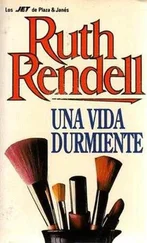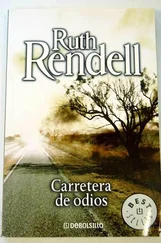He touched the damp brickwork, and a trickle of water fell between his fingers. He moved them along the wall, feeling for her, grunting now, making strong gruff exhalations. Then his hand touched her dress, moved up to her cold neck. But it felt warm to him and soft, like Bridget O’Neill’s. Was it he or she who gave that choking stifled cry? This time he used his tie to strangle her, twisting it until his hands were sore.
It took Arthur rather a long time to recover—about ten minutes, which was much longer than usual. But the deed had been more exciting and more satisfying than usual, so that was only to be expected. He restored her to her position against the wall, picked up the torch and made his way back to the cellar door. Cautiously he opened it. The window of Room 2 was still dark. Good. Excellent.
He stepped out into the yard, turned to close the door behind him. As he did so the whole court was suddenly flooded with light. And this light was as terrifying to him as the beam of a policeman’s torch is to a burglar. He wanted to wheel round, but he forced himself to turn slowly, expecting to meet the eyes of Anthony Johnson.
At first he saw only the interior of Room 2, the pale green flecked walls, the gateleg table propped by and piled with books, the primrose washbasin and that light glowing inside the pink and green polythene shade which, for some reason, was swinging like a pendulum. Then Anthony Johnson appeared under the swinging lamp, crossing the room; now, at last, staring straight back at him. Arthur didn’t wait. He hastened across the court, his head bent, a burning flush mounting across his head and neck. He scuttled through the passage, let himself into the house and went swiftly upstairs.
There, in his own flat, he sat down heavily. Vesta Kotowsky had come up in his absence and pushed her rent under his door, but he was so upset he let the envelope lie there on the doormat. His hands were trembling. Anthony Johnson had returned within less than half an hour of going out. It almost looked as if the whole exercise had been a plot to catch Arthur. But how could he know? He would know now or know something. Probably he was looking for some way of getting back at him for opening that letter. On the face of it, that letter hadn’t seemed very private, not like the ones postmarked Bristol would be, but you never could tell. It might be that this college of his had some sort of rule about students not taking jobs—Arthur admitted to himself that he knew very little about these things—and that he would be expelled or sent down or whatever they called it for attempting to do so. After all, what else could explain Anthony Johnson’s enraged rejection of his note, his deliberate shunning of him, his sneaking out like that followed by his purposeful illumination of the courtyard just as Arthur was emerging from the cellar?
The euphoria he felt after one of his killings totally ruined, Arthur passed a bad night. He sweated profusely so that he fancied the pink sheets smelt bad, and he stripped them off in a frenzy of disgust. Li-li had put her rent envelope under his door at some time in the small hours. By half-past nine he had assembled hers, the two envelopes of the Kotowskys—Vesta insisted on paying her half-share separately from that of her husband—and his own, and was seated downstairs waiting for Stanley Caspian. No more rent from Jonathan Dean, who would be leaving today, thank God, and none to collect (thank God again) from Anthony Johnson, who had paid two months in advance.
The hall was cold and damp. It was a foggy morning, an early harbinger of the winter to come. Stanley stumped in at ten past ten, wearing a checked windcheater that looked as if it was made from a car rug, and carrying a huge cellophane bag containing cheese puff cocktail snacks. Arthur began to feel queasy because the cheese puffs, orangey-brown, fat, and curvy, reminded him of overfed maggots.
Stanley split the bag open before he had even sat down, and some of the cheese larvae spilt out onto the desk.
“Put the kettle on, me old Arthur. Have a ‘Wiggly-Woggly’?”
“No thank you,” said Arthur quietly. He cleared his throat. “I was down in the cellar last night.” Forcing the carefully planned lie out with all the casualness he could muster, he said, “Looking for a screwdriver, as a matter of fact. The wires had come out of one of my little electric plugs.”
Stanley looked at him truculently. “You’re always grumbling these days, Arthur. First it was the dustbin, now it’s the electricity. I suppose that’s your way of saying I ought to have the place rewired.”
“Not at all. I was simply explaining how I happened to be in the cellar. In case—well, in case anyone might think I was snooping.”
Stanley picked cheese puff crumbs off the bulge of his belly whose ridges seemed as if they had been artfully designed to catch everything their possessor spilt. “I couldn’t care less if you go down the cellar, me old Arthur. Have yourself a ball. Ask some girls round. If you like spending your evenings in cellars, that’s your business. Right?”
Somehow, though he had intended wit, Stanley had got very near the truth. Arthur blushed. He was almost trembling. It was all he could do to control himself while Stanley filled in his rent book, banging in the full stops until it looked as if he would break his pen. Arthur put it back in its envelope himself and, muttering his usual excuse about Saturday being a busy day, made for the stairs. Half-way up them, he heard Anthony Johnson come out of Room 2 and use to Stanley—in mockery? He must have been listening behind the door—his own words of a few moments before:
“I was down in your cellar last night.”
8
————
Winter’s being out of stock of all but forty-watt light bulbs, Anthony had been obliged to go as far as the open-till-midnight supermarket at the northern end of Kenbourne Lane. This unsettled him for work, and when he saw Arthur Johnson coming out of the cellar its possibilities intrigued him. He had penetrated no further than the first room, but that was enough.
Stanley Caspian burst into gales of laughter. “I suppose you were looking for a screw?”
Anthony shrugged. Bawdy talk from a man of Caspian’s age and girth disgusted him. “You’ve got a lot of wood and cardboard and stuff down there,” he said. “If you don’t want it, can I have it? It’s for a Guy Fawkes bonfire.”
“Help yourself,” said Stanley Caspian. “Everyone’s got very interested in my cellar all of a sudden, I must say. You weren’t planning to have this here bonfire on my premises, I hope?”
Anthony said no thanks, it wasn’t suitable, which didn’t seem the reply to gratify Caspian, and left him to his rents. He walked over to the station where the little boys were once more at their post, and with them this time a black child. The white children knew him by now. Instead of asking for money, they said hallo.
“Why don’t we have a bonfire on that bit of waste ground?” But even as he spoke he checked himself. Wasn’t that the insinuating approach a child molester would use? “If you like the idea,” he said quickly, “we’ll go and talk to your parents about it.”
Leroy, the coloured boy, lived with his mother in a ground-floor flat in Brasenose Avenue. Linthea Carville turned out to be a part-time social worker, which gave her an immediate affinity with Anthony, though he would in any case have been drawn to her. He couldn’t help staring at her, this tall daughter of African gods, with her pearly-bloomed dark face, and her black hair, oiled and satiny, worn in a heavy knot on the crown of her head. But he remembered his plan, explained it, and within ten minutes they had been joined by white neighbours, the chairman of the Brasenose Tenants’ Association, and by the mother of Leroy’s taller friend, Steve.
Читать дальше











